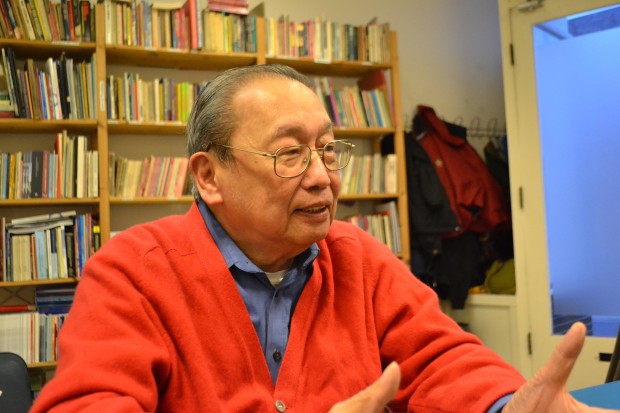
In this December 2015 photo, National Democratic Front chief political consultant Jose Maria “Joma” Sison talks to Philippine media at the NDF office in Utrecht. KRISTINE ANGELI SABILLO/INQUIRER.net
Reacting to “resurrected” accusations he and the late Sen. Benigno Aquino Jr. plotted the Plaza Miranda bombing in 1971, Communist Party of the Philippines (CPP) founding chair Jose Maria “Joma” Sison has reiterated that he had no role in the grenade-throwing in Quiapo, Manila, during a Liberal Party political rally.
Sison said former President Ferdinand Marcos used the bombing to justify his move to suspend the writ of habeas corpus and eventually declare martial law, noting the late dictator did not charge him, Aquino, and other coaccused for the incident due to lack of evidence.
“He (Marcos) did not charge us for it before any of his military commissions. Instead, he had Aquino and (Bernabe) Buscayno convicted and given the death sentence by a military commission in 1978 on trumped up charges unrelated to the Plaza Miranda incident. The charges of subversion and rebellion filed against me before two military commissions never included the Plaza Miranda in the specifications,” Sison recalled in an interview with Ilena Saturay, a copy of which was obtained by INQUIRER.net.
“The only instance when I was interrogated about the Plaza Miranda incident was on the evening of my day of arrest, Nov. 10, 1977. It was done by Col. Saturnino Domingo who asked me questions in a very intimidating and menacing manner at the Constabulary intelligence office. I showed him the mendacity and absurdity of the presumption of his questions. Thereafter, I was no longer asked questions about the Plaza Miranda incident even while I was under severe torture and interrogation at the Military Security Unit compound where I was detained,” he said.
Sison maintained that the accusations pinning him down as the brains behind the bombing that left nine people dead and 95 others injured were aimed to “discredit” CPP and the revolutionary movement.
“The highest military officials at the time openly attacked me for my lectures and statements abroad denouncing the US-Aquino regime and demanded that my Philippine passport be cancelled to force my return to the Philippines from late 1986 onwards while I was still in the Asia-Pacific phase of my tour. Then they proceeded to include in their anti-Sison attacks the Plaza Miranda incident,” he said.
“They succeeded in having my passport cancelled in 1988 and filing against me a case of subversion unrelated to the Plaza Miranda incident. By 1989 they succeeded in having the Senate president direct the blue ribbon and justice committees to hold joint committee hearings to investigate the Plaza Miranda incident,” he added.
The communist leader said his “military detractors” wanted to demonize him by presenting “purely hearsay and speculative testimonies” through witnesses in the 1989 Senate hearings, noting the Manila city prosecutor dismissed the complaint in 1994 as based on “sheer speculations.”
“Those attacks are pure rubbish. They usually recycle false testimonies against me and conjectures from previous publications against me. They never present my side in full even if the case file is available and the submissions and counter-submissions are accessible,” he said.
“Those who attack me have varying motives. The ideologically motivated attack me as the personification of the entire revolutionary movement. They calculate that by doing so they have a short cut for discrediting the entire movement. There are also some attackers who turned renegades or traitors to the revolutionary movement and try to justify their renegacy or betrayal by vilifying me and the entire movement. There are also mere crooks. They attack me in order to a make some bucks. They do so now as paid agents of Bongbong Marcos,” Sison added.
The CPP head also belied allegations that Aquino, father of President Benigno Aquino III and husband of the late democracy icon Corazon Aquino, was cofounder of the communist party and the New People’s Army and his family had been collaborating until the early months of his wife’s administration.
“Ninoy Aquino could not have been a communist or founder of the CPP. He was well known as a CIA asset from the time he was a war correspondent in Korea. He was the political representative of the comprador big bourgeoisie and the landlord class. He made himself popular by harping only on issues of corruption and civil liberties. He never opposed the ruling system of big compradors and landlords,” he said. RC